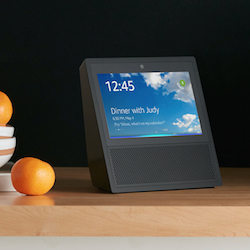
Fort Worth, TX-based management company Civitas Senior Living is testing a virtual assistant and virtual reality in the Lone Star State.
The company has partnered with Capitol Seniors Housing, a Washington, D.C.-based private equity-backed real estate acquisition, development and investment management firm, and CT Home, a smart home technology company specializing in custom solutions for senior living, to pilot-test the use of Amazon’s virtual assistant, Alexa, in each resident apartment at Park Creek Independent Living in suburban Houston.
The test represents the first scaled use of Amazon’s Alexa technology in Texas for senior living, according to Leon Coe, co-founder of CT Home.
“Civitas has been investigating technology that would make communicating with our independent living residents even more effective — things like daily announcements, notifications, the community’s calendar of events,” Civitas co-founder and Chief Operating Officer Cooper Vittitow told McKnight’s Senior Living. “We met the founders of CT Home, and they introduced us to their platform. We like that we can customize the data and roll it out to fit our needs. Now, a resident can simply ask, ‘Alexa, what’s for lunch today?’ and get that information instantly.”
Any Park Creek resident who chooses to participate in the program will receive a complimentary Alexa device. Residents also can use the devices to set reminders, stay connected with family and friends and receive updates on news or sports.
“Residents will be able to customize their own experience,” Vittitow said. “It makes their lives that much richer and carefree.”
The program’s goal is to enable residents to maintain their independence and freedom while ensuring that they are as connected as they want to be to their personal network, fellow residents and community programming.
For now, the pilot is limited to Park Creek.
“We’re focusing on independent living communities for CT Home’s Alexa device, and Park Creek is our newest community that is strictly independent living,” Vittitow said. “That allows us to roll it out to a smaller audience and test it. As Park Creek grows, so will this new system.”
Civitas has plans to roll out the virtual assistant to its other independent living communities, however, Vittitow said.
“Realistically, our goal is six to nine months,” he said. “But we want to really understand our residents’ needs before launching the program at other communities.”
The company’s portfolio includes 31 operational communities as well as 25 communities in development. Forty percent of them have an independent living component, according to Vittitow.
Virtual reality
Meanwhile, Civitas has partnered with Dallas-based MyndVR to introduce virtual reality to the residents of Midtowne Assisted Living and Memory Care in suburban Dallas.
A recently begun pilot program is exploring the effects of curated virtual reality content on residents. The hope is that doing so will create happy, calming and memorable experiences.
“When it comes to using technology to enrich our residents’ lives, Civitas strives to be an industry leader, and the idea of introducing virtual reality to our communities really excited us,” Vittitow said. “Our residents love the local trips we arrange for them at our various communities. So how could we go to the next level and take them on the journey of a lifetime without leaving their home? Virtual reality lets us do just that.”
Residents put on headphones and virtual reality goggles powered by a smartphone to experience various scenarios in two-minute, 360-degree videos.
“They can visit a jazz club, go deep-sea fishing or experience something familiar from their past,” Vittitow said. “We were impressed with the robust content that MyndVR offered and wanted to see how our residents responded.”
The Civitas pilot follows a recently completed large-scale national pilot by MyndVR that involved several hundred people in senior living communities, including those living independently as well as those with Alzheimer’s disease, Parkinson’s and other conditions, said MyndVR co-founder and CEO Chris Brickler.
“We observed mood improvement, reductions in feelings of isolation, triggering of memories, an increased sense of connection and lifted spirits among participants,” he said.
For now, Civitas’ virtual reality pilot is limited to Midtowne, Vittitow said. It will last six weeks.
“Midtowne is owned by Civitas and close to our home office,” he said. “It makes it easier for us to monitor the program and gauge the residents’ reactions. Currently, we’re testing the VR with our assisted living residents and hope to roll it out to the memory care neighborhood next.”
Long-term, Vittitow said, Civitas may expand the program to other communities.
“After we finish the program and analyze the feedback, we’ll determine how we move forward,” he said. “We love the idea of making virtual reality a regular part of our residents’ daily programming.”
Editor’s Note, Oct. 4, 2018: CT Home has changed its name to VoCo.



